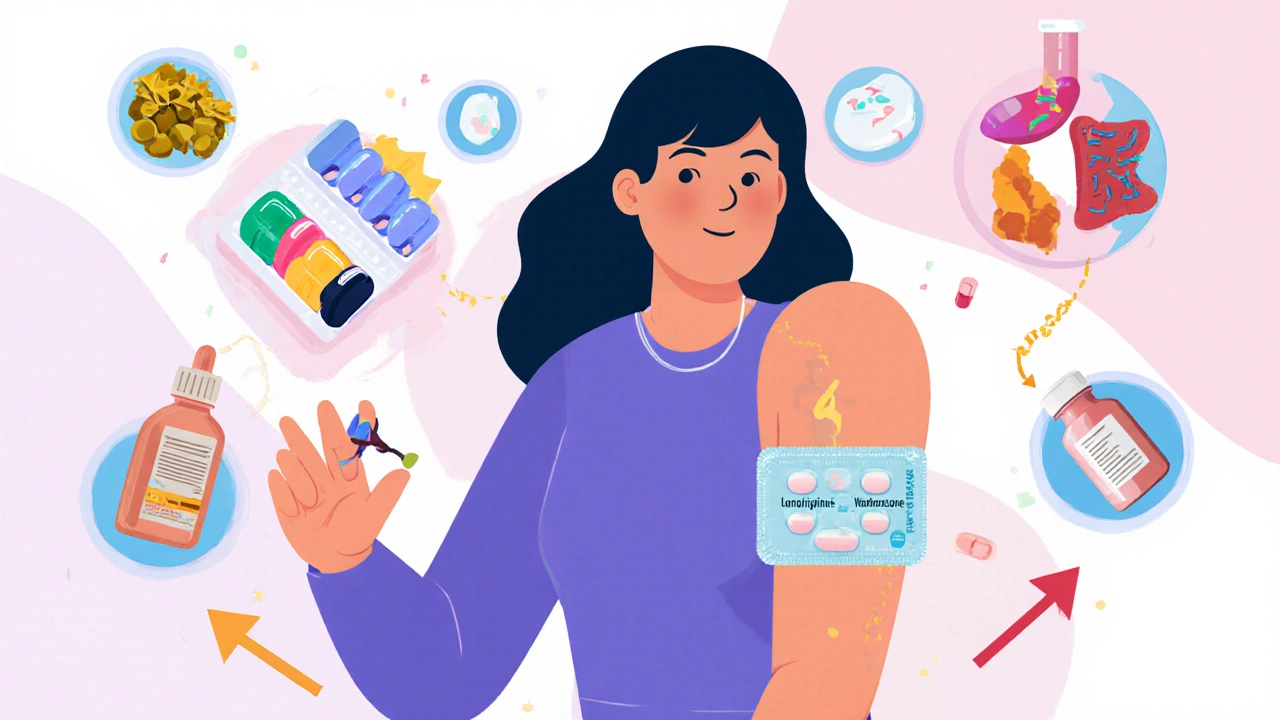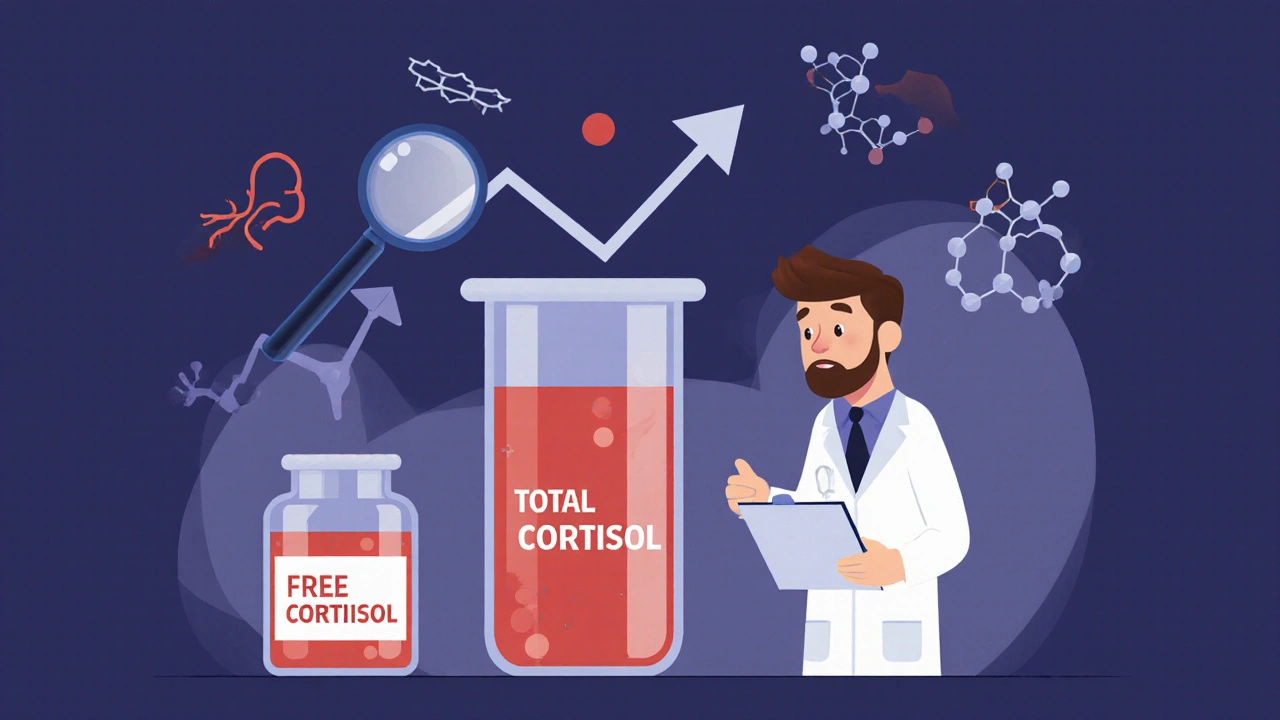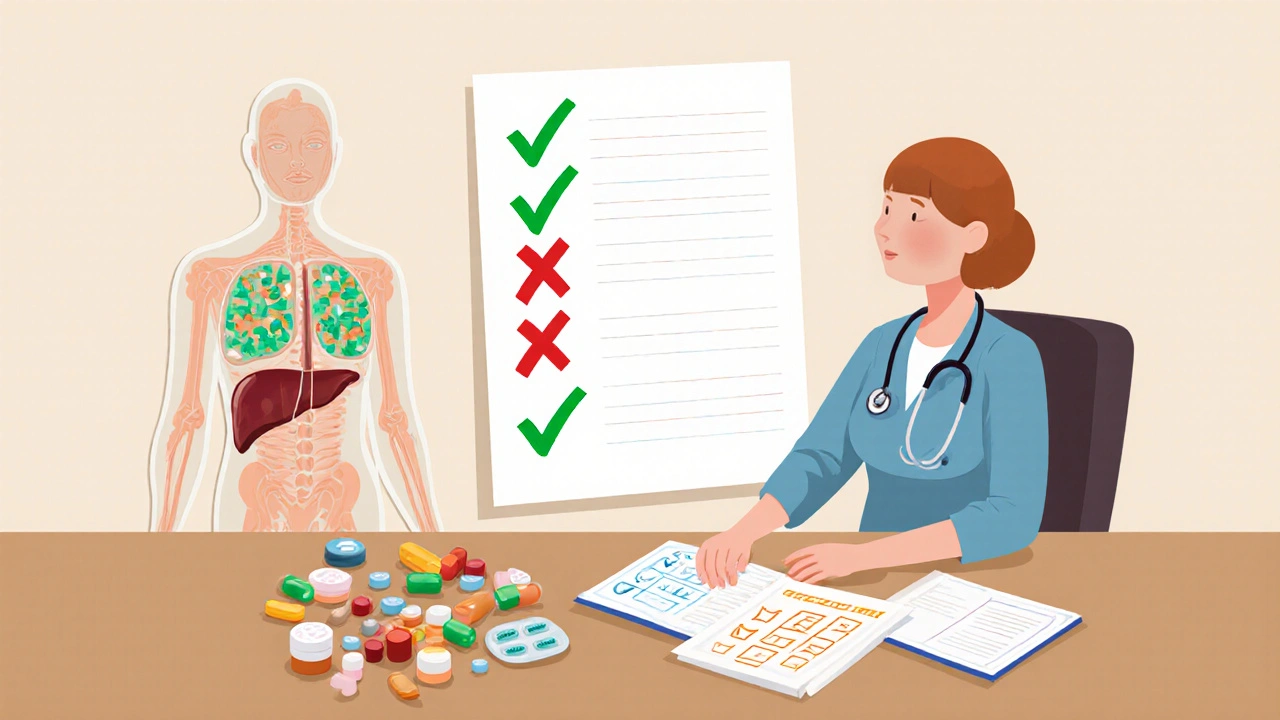Hormone Replacement Therapy: What Medications It Interacts With and Why

When you start hormone replacement therapy (HRT) for menopause, you’re not just adding one drug to your routine-you’re changing how your whole body processes other medicines. Many women don’t realize that the estrogen and progestin in HRT can make some of their other medications work less effectively-or even cause dangerous side effects. This isn’t theoretical. Real cases have been documented: women on lamotrigine for depression saw their symptoms return after starting HRT, not because their depression got worse, but because their blood levels of lamotrigine dropped by nearly half.
How HRT Changes How Your Body Processes Medicines
HRT doesn’t just replace hormones-it tricks your liver into changing how it breaks down other drugs. Estrogen, especially in oral pills, tells your liver to make more of certain enzymes, like UGT1A4. This enzyme is responsible for cleaning up medicines like lamotrigine, an anticonvulsant used for epilepsy and mood disorders. When estrogen ramps up UGT1A4, lamotrigine gets cleared from your blood faster. That means you’re not getting the full dose anymore, even if you’re taking the same pill.
This isn’t just about lamotrigine. The same mechanism affects other drugs metabolized by liver enzymes, including some antibiotics, tuberculosis meds, and HIV treatments. The NHS warns that HRT can make epilepsy harder to control because of these interactions. The problem is worse with oral HRT because the hormones go straight to the liver after swallowing. Skin patches, on the other hand, deliver hormones slowly through the skin, bypassing the liver’s first pass. That’s why patches are less likely to interfere with other meds.
Medications That Don’t Play Well With HRT
Here are the most common and dangerous interactions you need to watch for:
- Lamotrigine: Estrogen-based HRT can cut lamotrigine levels by up to 50%. Women have reported worsening depression or seizures after starting HRT. Stopping HRT often brings lamotrigine levels back up.
- St. John’s wort: This herbal supplement for mild depression speeds up the breakdown of estrogen. It can make HRT less effective, leading to hot flashes, mood swings, or breakthrough bleeding. The NHS explicitly says to avoid it with HRT tablets.
- Corticosteroids (like hydrocortisone): HRT increases a protein called CBG in the blood, which binds to cortisol. This makes standard cortisol blood tests useless for checking if your hydrocortisone dose is right. You might be underdosed and not even know it.
- Anticoagulants (warfarin, apixaban): Estrogen can slightly increase clotting risk, which may counteract blood thinners. Your doctor may need to monitor your INR more closely if you’re on both.
- Thyroid hormone (levothyroxine): HRT can increase thyroid-binding proteins, making your thyroid hormone less available. You might need a higher dose of levothyroxine after starting HRT.
- Resveratrol: Found in red wine and supplements, this compound mimics estrogen and may interfere with HRT’s action, though evidence is still weak.
Even something as simple as a multivitamin with high-dose B6 or magnesium can affect how HRT is absorbed. Always tell your pharmacist or doctor what you’re taking-even if you think it’s "just natural."
Why Transdermal HRT Might Be Safer
If you’re on multiple medications, especially those with narrow therapeutic windows, switching from oral HRT to a patch or gel might be the smartest move. Transdermal delivery avoids the liver’s first-pass metabolism. That means fewer enzyme changes, fewer drug interactions, and more stable hormone levels.
The NHS confirms that patches are "less affected" by substances like St. John’s wort or antibiotics. A woman on lamotrigine who switched from Femoston (oral) to an estradiol patch saw her lamotrigine levels stabilize within weeks. No dose changes. No worsening symptoms. Just a different delivery method.
It’s not a magic fix-patches still contain estrogen-but they reduce the risk dramatically. If you’re on epilepsy meds, antidepressants, or thyroid drugs, ask your doctor if a patch is an option. You might not need to stop HRT-you just need to change how it’s delivered.

The Cortisol Trap: When HRT Skews Lab Results
One of the sneakiest HRT interactions isn’t about how well a drug works-it’s about how doctors think it’s working. If you’re taking hydrocortisone for adrenal insufficiency and then start HRT, your total cortisol blood levels will jump. Not because you’re making more cortisol, but because HRT increases a protein that binds cortisol in the blood.
Here’s the problem: standard cortisol tests measure total cortisol, not the active free form. So your doctor might see high numbers and think you’re overdosed, when you’re actually normal-or even underdosed. The Pituitary Foundation says this makes cortisol tests useless for monitoring hydrocortisone replacement in women on HRT. The solution? Use ACTH stimulation tests or measure free cortisol directly. Don’t rely on routine cortisol panels.
What to Do Before Starting HRT
Don’t wait for problems to show up. Before you start HRT, make a full list of everything you take:
- All prescription drugs (including painkillers and sleep aids)
- All supplements (vitamins, herbs, fish oil, resveratrol)
- All over-the-counter meds (ibuprofen, antacids, cold pills)
- Any herbal teas or wellness tonics
Take this list to your doctor or pharmacist. Don’t assume they’ll ask. Most won’t unless you bring it up. If you’re on lamotrigine, warfarin, or hydrocortisone, be extra clear. Say: "I’m on HRT and I need to know if this will affect my other meds."
Also, ask: "Is there a patch or gel version of HRT that would be safer for me?" Many doctors still default to pills because they’re cheaper and more familiar. But if you’re on other meds, that’s not always the best choice.

Red Flags: When to Call Your Doctor Immediately
Some interactions don’t cause slow decline-they cause sudden danger. If you start HRT and notice any of these, contact your doctor right away:
- Sudden, severe headache or dizziness
- Swelling in hands, feet, or ankles (could mean fluid retention from steroid interactions)
- Worsening depression, anxiety, or seizures
- Unexplained bruising or bleeding (possible blood thinner interference)
- Loss of vision, slurred speech, or weakness on one side of the body
These could signal a blood clot, stroke, or dangerously low drug levels. Don’t wait. Don’t assume it’s "just menopause."
What About Bioidentical HRT?
Some women turn to "bioidentical" hormones, marketed as more natural and safer. But here’s the truth: they still contain estrogen and progesterone. Whether they’re made in a lab or compounded in a pharmacy, they interact with your liver the same way. There’s no evidence that bioidentical HRT avoids interactions with lamotrigine, corticosteroids, or anticoagulants. In fact, because they’re not standardized, you might not even know how much estrogen you’re getting-making interactions harder to predict.
Regulators like the FDA and European Medicines Agency warn that compounded bioidentical HRT lacks safety data. Stick to FDA-approved formulations. They have documented interaction profiles. Compounded ones don’t.
The Bottom Line
HRT can be life-changing for menopause symptoms-but it’s not a simple hormone swap. It’s a system-wide shift that affects how your body handles every other medicine you take. The interaction with lamotrigine is just the tip of the iceberg. Cortisol tests, blood thinners, epilepsy drugs, even herbal supplements-all can be thrown off by estrogen.
The safest approach? Be proactive. Know your meds. Ask about patches. Don’t assume "natural" means safe. And never start or stop HRT without talking to your doctor about everything else you’re taking. Because when hormones and medications collide, the consequences aren’t theoretical-they’re real, measurable, and sometimes life-threatening.
Can HRT make my epilepsy worse?
Yes, especially if you’re taking oral estrogen-based HRT and an anticonvulsant like lamotrigine. Estrogen can speed up the breakdown of lamotrigine, lowering its blood levels and reducing its effectiveness. This can lead to more frequent seizures. Switching to a transdermal patch may help, as it avoids this liver interaction. Always tell your neurologist if you start or change HRT.
Is it safe to take St. John’s wort with HRT?
No. St. John’s wort speeds up liver enzymes that break down estrogen, making HRT less effective. This can cause hot flashes, irregular bleeding, or return of menopause symptoms. The NHS and other health authorities explicitly advise against combining them. If you need help with low mood, talk to your doctor about alternatives that won’t interfere with HRT.
Why can’t I use cortisol tests to check my hydrocortisone dose if I’m on HRT?
HRT increases a protein called CBG that binds cortisol in the blood. This raises your total cortisol levels on standard tests-even if your actual free (active) cortisol hasn’t changed. This can make your doctor think you’re overdosed when you’re not. To monitor hydrocortisone properly, you need special tests like ACTH stimulation or free cortisol measurements. Don’t rely on routine cortisol panels.
Do HRT patches have fewer interactions than pills?
Yes. Oral HRT passes through the liver first, triggering enzyme changes that affect other drugs. Patches deliver hormones slowly through the skin, bypassing the liver. This means fewer interactions with medications like lamotrigine, antibiotics, or St. John’s wort. If you’re on multiple meds, patches are often the safer choice.
Should I stop HRT before surgery?
Yes-if you have risk factors like smoking, a history of blood clots, stroke, or breast cancer. The U.S. National Library of Medicine recommends stopping estrogen and progestin 4 to 6 weeks before major surgery or prolonged bed rest. This reduces the risk of dangerous blood clots. Always tell your surgeon you’re on HRT, even if it’s a patch.
Are bioidentical HRT products safer than standard HRT?
No. Bioidentical HRT still contains estrogen and progesterone, and they interact with other drugs the same way. Compounded versions aren’t standardized, so you might not even know your dose. There’s no evidence they avoid interactions. FDA-approved HRT has documented interaction profiles. Stick with those unless your doctor has a specific reason not to.
Can HRT affect my thyroid medication?
Yes. Estrogen increases thyroid-binding proteins, which can reduce the amount of active thyroid hormone available. If you’re on levothyroxine, your doctor may need to increase your dose after starting HRT. Get your TSH levels checked 6-8 weeks after starting HRT to make sure your thyroid dose is still right.
If you’re on HRT and another medication, don’t guess. Ask. Check. Monitor. Your safety depends on it.

Reginald Matthews
October 30, 2025 AT 08:32I never realized how much HRT could mess with my meds. I’m on lamotrigine for bipolar and just started a patch last month-no issues yet, but now I’m double-checking everything with my pharmacist. This post saved me from a potential disaster.
Also, the cortisol thing? Wild. I’ve been getting weird lab results for months and no one could explain it. Now it makes sense.
Debra Callaghan
October 30, 2025 AT 20:55People need to stop taking St. John’s wort like it’s harmless tea. It’s not. It’s a drug. And if you’re on HRT and still using it, you’re just asking for trouble. Stop being lazy and get a real prescription for depression. Your body isn’t a DIY experiment.
Mitch Baumann
November 1, 2025 AT 06:26…and yet, the literature on transdermal estrogen’s pharmacokinetic profile remains underutilized in clinical practice. One must wonder whether the inertia of oral formulations is rooted in entrenched prescribing habits-or perhaps, more cynically, in pharmaceutical marketing.
Moreover, the omission of CYP3A4 induction as a confounding variable in the lamotrigine interaction is… problematic. 🤔
Gina Damiano
November 2, 2025 AT 22:08Wait, so if I’m on levothyroxine and start HRT, I need a higher dose? My doctor never told me that. I’ve been feeling so tired lately… I’m going to call them tomorrow. Thank you for this. I’m not alone in this.
Also-anyone else feel like doctors treat HRT like it’s just ‘vitamins for women’? It’s not. It’s a hormonal nuclear bomb.
Emily Duke
November 3, 2025 AT 03:07OMG I KNEW IT. I’ve been on HRT pills for 2 years and my anxiety got worse, my seizures got worse, I thought I was losing my mind… turns out my lamotrigine was getting flushed out. I switched to a patch 3 months ago and my brain finally stopped screaming. Why didn’t anyone tell me this before??
Also, St. John’s wort? I took that for ‘natural relief’-I’m so dumb. I’m never trusting ‘natural’ again. 😭
Stacey Whitaker
November 4, 2025 AT 07:01Just moved from Australia to the US and the way doctors here treat HRT is wild. Back home, they automatically ask about other meds before prescribing. Here? They hand you a pill and say ‘take it daily.’
Thanks for the clarity. Patch or bust from now on.
Kayleigh Walton
November 4, 2025 AT 23:06This is such an important post-and so many women don’t know this stuff. If you’re on HRT and another medication, please, please, please make a list and bring it to your doctor. Don’t assume they’ll know. Don’t assume it’s ‘fine.’
And if your doctor dismisses you? Find a new one. Your health isn’t negotiable. You deserve someone who listens.
Also-patches are amazing. If you’re on multiple meds, it’s worth the extra cost. Your liver will thank you.
Stephen Tolero
November 6, 2025 AT 10:42Transdermal HRT reduces first-pass hepatic metabolism. This is well-documented in pharmacokinetic studies since 2010. The clinical recommendation is clear: prioritize non-oral routes in polypharmacy patients. The evidence is not speculative-it is standard of care.
Brooklyn Andrews
November 7, 2025 AT 15:49Just switched to patch after reading this. My thyroid levels went back to normal in 3 weeks. My doctor was like ‘huh, weird’-now he’s calling me ‘the patch queen.’ 😎